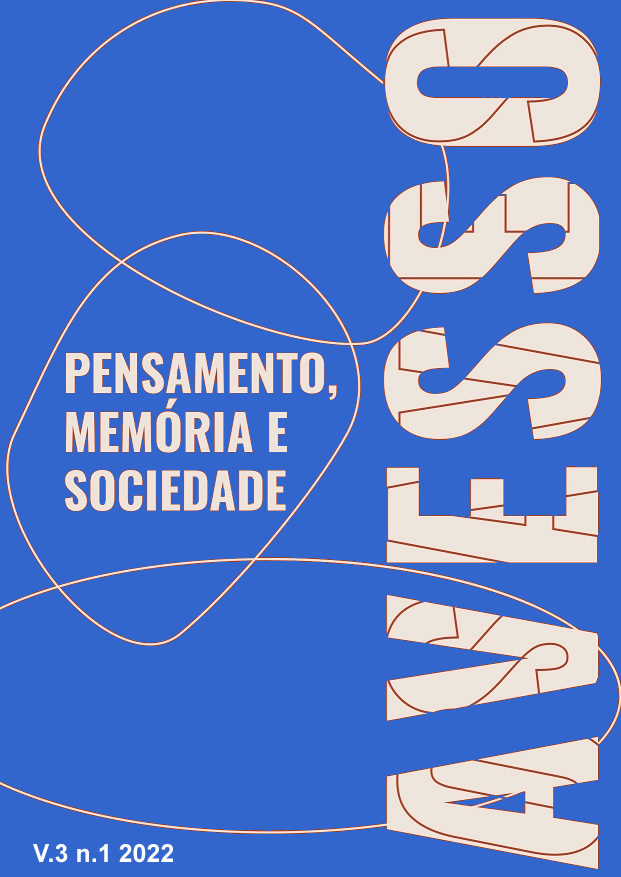The place of traumatic testimony and the representation in documentaries about Military Dictatorship in Brazil.
DOI:
https://doi.org/10.23925/2675-8253.2022v3n1A5Keywords:
Testimony, Dictatorship, Memory, Documentary, TraumaAbstract
The purpose of this research is to understand how the testimony of survivors of authoritarian regimes occurs, especially the Military Dictatorship of Brazil, and to identify how the documentaries present these traumatic reports in their narrative. The place of the testimony in the construction of the memory of society will be discussed, its relevance in the collective scenario and how the testimony originates and behaves in the cinematographic language. There will be a combination of historical, philosophical and literary knowledge and analysis of the film narrative about the behavior of the testimony in the documentary. In this way, it will be possible to understand how cinema records and signifies trauma, characterized as a memory that does not pass.
References
AGAMBEN, Giorgio. O que resta de Auschwitz: o arquivo e o testemunho (Homo Sacer III). São Paulo: Boitempo Editorial, 2008.
BARROS, José D´Assunção. Cinema e História: entre expressões e representações. In: NÓVOA, Jorge; BARROS, José D´Assunção. Cinema História: teoria e representações sociais no cinema. Rio de Janeiro: Apicuri, 2008.
Brazil: A Report on Torture. Direção: Hannah Eaves. EUA, 1971. 1 vídeo (60 min).
FELTRIN DE SOUZA, Fábio Francisco. Resenha "O que resta de Auschwitz: o arquivo e o testemunho (Homo Sacer III)" de Giorgio Agamben. Revista Tempo e Argumento, vol. 2, Florianópolis, p. 247-250, 2010.
FERRO, M. Filme: uma contra-análise da sociedade? In: LE GOFF, J.; NORA, P. (Orgs.). História: novos objetos. Rio de Janeiro: Francisco Alves, 1976, p. 202-203.
LEVI, Primo. É isto um Homem? São Paulo: Companhia das Letras, 2010.
MASCARELLO, Fernando. História do cinema mundial. São Paulo: Papirus Editora, 2006.
MORETTIN, Eduardo Victorio. O cinema como fonte histórica na obra de Marc Ferro. História: Questões & Debates, Curitiba, n. 38, p. 11-42, 2003.
NÓVOA, Jorge. Apologia da relação Cinema-História. In: NÓVOA, Jorge; BARROS, José D´Assunção. Cinema-História: teoria e representações sociais no cinema. Rio de Janeiro: Apicuri, 2008.
On vous parle du Brésil: Tortures. Direção: Chris Marker. França, 1969. 1 vídeo (24 min).
SARLO, Beatriz. Tempo passado cultura da memória e guinada subjetiva. São Paulo: Companhia das Letras, 2007.
SELIGMANN-SILVA, Márcio. Estética e política, memória e esquecimento: novos desafios na era do Mal de Arquivo. Revista Remate de Males, Campinas, p. 271-28, 2010.
SELIGMANN-SILVA. Imagens precárias: inscrições tênues de violência ditatorial no Brasil. Revista Estudos de Literatura Brasileira Contemporânea, Brasília, p. 13-34, 2014.
SELIGMANN-SILVA. Narrar o trauma – A questão dos testemunhos de catástrofes históricas. Revista Psicologia Clínica, Rio de Janeiro, p. 65-82, 2008.
UMBACH, Rosani Úrsula Ketzer. Literatura e história: os discursos da memória. Revista Fragmentos, Florianópolis, p. 105-119, 2010.
Downloads
Published
How to Cite
Issue
Section
License
Copyright (c) 2022 Revista Avesso: Pensamento, Memória e Sociedade

This work is licensed under a Creative Commons Attribution-NonCommercial-ShareAlike 4.0 International License.














